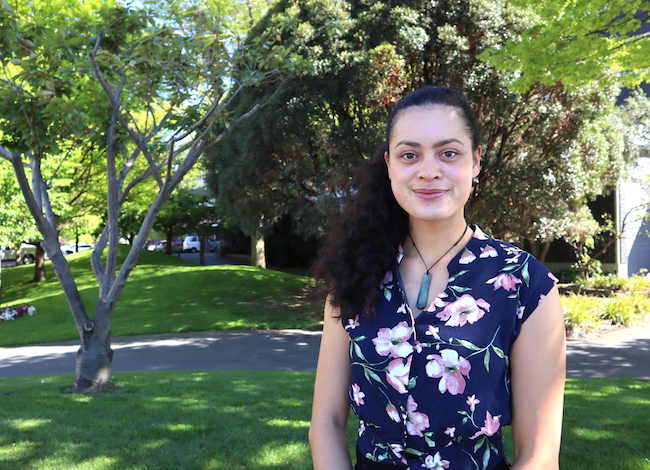Monday 2 November 2020 10:34am

Jordon Lima is a woman on a mission. She has just been awarded a prestigious HRC Māori Health Research Career Development Award that will fund her PhD research for the next three years, and as she describes her plans, her eyes shine and her excitement is palpable.
Her intention is to bring two worlds closer together – that of scientific academia and Te Ao Māori – to improve colorectal cancer survival for Māori and rural populations.
Jordon grew up in South Canterbury, but her iwi is Ngāti Porou, her hapū is Ngāti Horowai, and she has strong family ties on the East Coast of the North Island.
Through her PhD project, Jordon aims to improve several aspects of cancer care for Māori and rural patients: the delivery of cancer diagnosis and surveillance tools guided by direct consultation with Te Tai Poutini (West Coast of the South Island) clinicians and communities, and the actual technology underlying these tools.
The project centres on a way of testing for cancer where you look for circulating tumour DNA in a person's blood sample. These are fragments of DNA that are released from cancerous tumours into the bloodstream, and can be used to detect cancers early, follow a patient's response to treatment, and determine the risk of the disease recurring.
Jordon has already brought the worlds of biomedical science and Te Ao Maori closer together, albeit on a smaller scale, through her use of whakataukī (Māori proverbial sayings) in her Honours dissertation. The dissertation describes her past year of research investigating mutations as biomarkers for colorectal cancer, and each chapter is structured around a whakataukī that embodies the work contained within them.
For example, her introduction uses a whakataukī that resonates in the context of biomedical research, where scientists often contribute a small part of the solution to a large problem and collaboration ultimately provides the overall solution:
"Ahakoa he iti te matakahi, ka pakaru i a ia te tōtara."
(Even though the wedge is small, it brings down the mighty totara tree.)
Jordon's motivation is strongly rooted in her personal experience. "I have felt the loss of my culture due to being raised outside of my tribal area, despite identifying as Māori and constantly being judged as such. I have also felt the loss of my family and friends due to cancer", she states. Ultimately, she aims to help establish high standards for biomedical research conducted within Māori communities, and to improve access and engagement with the healthcare system.
She will be supervised by Professor Parry Guilford of Te Tari Matū Koiora (the Department of Biochemistry) and Dr Karyn Paringatai of Te Tumu (the School of Māori, Pacific and Indigenous Studies), both of the University of Otago. Prof Guilford was also her supervisor for her Honours research project, on which Dr Paringatai helped as an unofficial advisor.
Jordon has two key objectives for her PhD. The first objective is to use tikanga Māori (the customary system of values and practices) to develop clinical procedures to deliver the test. This will require developing close relationships between project investigators and community members, and analysis of existing healthcare inequities, public health policies, and wider socioeconomic factors for Māori and rural populations in New Zealand.
The second objective is to improve the technology used to detect circulating tumour DNA. In her planned laboratory work, Jordon will examine the performance of a method of detecting circulating tumour DNA, aiming to establish the sensitivity and specificity for that technique. The cancer tests being explored by the Guilford research group are intended to be more effective and easier to provide to isolated communities than the diagnosis and surveillance tools currently used by medical services.
Her PhD work will start early next year; over the summer she will be working on another Māori Health project, also funded by the HRC, and supervised by Dr Megan Leask of the Department of Biochemistry. In that project, Jordon will be investigating a genetic variant found in Māori and Pasifika populations that both significantly reduces the risk of gout for carriers and also has a strong effect on height.
You can find out more about research in Parry and Karyn's research groups and recent University of Otago HRC funding awards here:
Professor Parry Guilford's research profile
Dr Karyn Paringatai's research profile
Otago health careers development boosted by $2.7 million